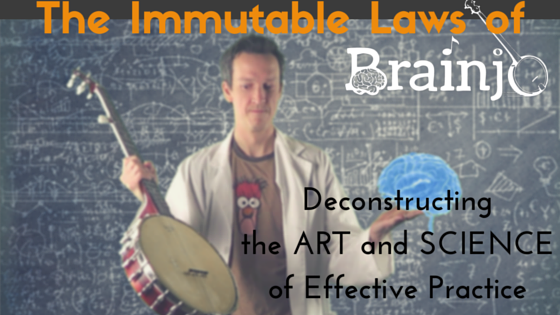
Episode 22: How To Use the Banjo to Slow Down Time
According to my calendar or, more accurately, my iPhone, 2017 has arrived.
But, if you’re like me, you may wonder where 2016 went. Or 2015. And wasn’t it just the other day we were freaking out about Y2K?
Yes, the older I get, the faster each year seems to pass by. Holidays and birthdays pile up, smearing together into an indistinguishable blur.
And I don’t like it, not one bit. I happen to enjoy my time on this planet, and I know that time is finite. None of us can know in advance how long this ride will last, but I’d much rather it feel like a slow walk I can savor rather than a speeding train that leaves me struggling to keep up.
Now, in this “Laws of Brainjo” series, I usually focus on how to use neuroscience to maximize learning, ways to hack into our brain’s source code to get the biggest bang for our practicing buck.
This installment is slightly different. We’ll still be hacking source code, but in this case it’s for the purposes of altering our perception of time. To bring a little more slow walking and a little less speeding train into our lives.
The good news? If you’re reading this, you’re already part of the way there.
Relatively Speaking
Throughout history, we humans have wrestled mightily with the concept of time.
Our intuition tells us that time is a property of the universe that exists independently of us. No matter what we do, it’s out there, marching forward at the same speed. In this view, time is fixed, unchanging, and regular, like the taunting tick of the metronome.
But Albert E. and his ingenious thought experiments demonstrated that these intuitions we have about time were actually completely wrong, no matter how true they may feel deep in our bones. Time, is in fact, relative. Even its forward movement isn’t some inviable, fundamental feature.
So perhaps it should not be surprising that our perception of time is also not fixed, but flexible. All minutes are not create equal. After all, everyone knows that “time flies when you’re having fun.”
The year it took to go from your 4th to your 5th birthday felt like an eternity. The year it took to go from your 49th to your 50th seems to go by in the blink of an eye.
One possible explanation for this phenomenon, and perhaps the most commonly held one, is purely mathematical. In relation to the rest of our lives, every minute we experience is relatively shorter than the preceding one.
For example, the year it took to move from age 4 to 5 was 20% of our time on this earth. The year we go from age 49 to 50? A mere 2%.
If this is indeed the only way our brain perceives the passing of time, then there’s no way out of this mathematical absolute. If this is true, then we are guaranteed to experience time as forever increasing in speed.
Of course, there’s more to this story. Otherwise this would make for a terrible article!
And the best part is that there IS something we can do about it. That our perception of time’s passing depends on much more than a cold mathematical analysis.
Learning To Prolong Time
When we’re young, bright eyed, and squishy, everything is new to us. We know nothing of the world around us, and must take it all in. By simply existing, our brain is bombarded with new and varied experiences all the time. Our conscious mind is forever in the present moment, because it HAS to be.
And there’s so much to learn!
As time goes by, however, we start to make sense of stuff, and we start to get the hang of how our bodies work.
Eventually, we develop a vast library of habits and routines that carry out all the maintenance tasks of being a functioning humanoid. Their machinery is housed beneath our awareness, in the “subconscious,” freeing up our conscious mind to occupy itself with other stuff, should we choose to do so.
And the research on time perception indicates that it’s this feature of childhood, this continuous barrage of new experiences and learning that is a key ingredient in how we perceive the passage of time. In studies of time perception, groups of subjects assigned to perform more novel tasks consistently judged the passing of time to be longer (in retrospect) than groups assigned less novel tasks.
Having new experiences, and learning new things, slows our perception of time. And so one antidote to time’s accelerating passing then is to always be learning.
The deck here is stacked against you a bit, mind you. As a child, continuous learning is an inevitable byproduct of existence. Loading your moments with new experiences and new things to learn as an adult, however, requires deliberate effort.
And the structure of our societies only compounds the issue. School, and learning in general, is usually viewed as something we do when we’re young. By adulthood, we’re supposed to know everything we need to know to make it in this world, whatever that means. As a result, it’s quite easy for us to move through our days on autopilot, relying mainly on our hard won habits, and then wonder where the time went.
But our brain’s remarkable capacity to learn new things doesn’t just up and vanish after childhood. We’re wired for lifelong learning. And the more we engage that remarkable capacity, the longer our days will seem.
As I said earlier, chances are if you’re reading this that you’ve already begun to hack your time perception. Attempting to tackle a musical instrument as an adult is a great way to make the seconds stretch. This is most true in the early stages, however, when there’s much to learn. If you want to continue to reap the time shifting capabilities of banjo picking, you’ll have to be a bit more intentional about continuing to push your boundaries – whether it’s trying a new genre of music, going to your first jam, or learning a new style of picking.
Not only will you grow in the process, but you might get to savor 2017 just a little while longer.
